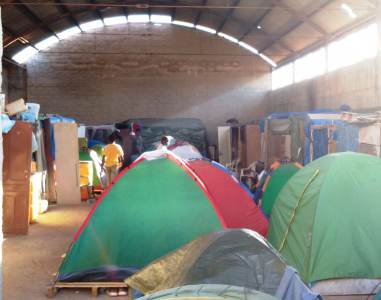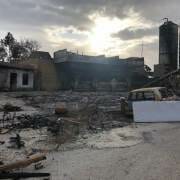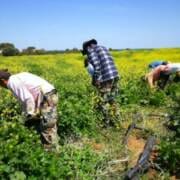Campobello 2019: another olive harvest in the name of exploitation
“What can I tell you? We see each other every year, but it keeps getting worse – and now this year there are no olives and so work is even more complicated. I really have nothing to say to you, I’m sorry…take a walk and tell me one good thing about this hell.”
Moussa’s outburst is understandable, given he now lives permanently in Campobello and is well-acquainted with its dynamics: “You continue to make so-called technical committees, but increasingly we are made slaves, we are pushed around for a contract, we’re blacks just good enough to pick the olives and then exist no more, trapped in this cement plant, hidden from everyone’s sight…but what the hell are you doing on these committees?”
Moussa is forced into exploitation despite holding a permesso di soggiorno (residence permit), and must put away every euro he earns because the money has to last when the work runs out. “With the fake contracts they make me I won’t have the right to request unemployment pay.
A chronic question
We have been denouncing the situation in Campobello for years; this year the institutions have excluded the associations from the technical committees, but as Moussa recounts, they have yielded nothing.
This observation should lead us to reflect as well on the actions of local associations that, as a network, have failed Campobello miserably, begging the question of how to respond effectively in these situations.
The prefecture of Trapani, with the support of labor unions and offices, has enacted a plan that forces about a thousand people into invisibility who are recovered year by year in time to harvest valuable olives. It’s a situation that has gone on for 25 years, although the numbers have increased in recent times. The institutions use triumphant language to describe the results obtained, proudly presenting the implementation of a camp for 240 people – who possess stay permits – at the former oil mill of Fontane d’Oro, in which the Red Cross has set up camp and shower tents. This year, in contradiction to last, there is no catering service and no entrance fee, but this is only because last year’s daily admittance fee was a total flop, resulting in the inability to collect funds promised to the Red Cross.
The institutions also boast of the success of the on-site overnight accommodations that farms provide their workers. The problem is that, without any type of oversight, many people are placed in terrible conditions lacking basic services (bathroom, shower, etc.) and end up staying in the fields or in abandoned houses. This year has also seen the operation of a service agency, Varvaro, that directly scouts labor for companies by going around Campobello and its surrounding areas, taking care of the dispatch procedures. The agency has also renovated and opened an old facility providing beds and showers, for a daily fee.
All of this should, in theory, have led to the emptying of the former cement factory; yet this skeleton of a place currently holds around 600 people, mostly of Senegalese origin, regular and transient, old and young, who arrive from all over Italy to work.
The hidden reality behind the claims of the institutions
The triumphant declarations of the administrations of Campobello and Casteveltrano are, thus, refuted by the facts. Indeed, they made the claim that they had to evacuate the site of Erbe Bianche for archaeological interest. In reality, Erbe Bianche remains a dump despite the 62,000 euros spent, money that could have been used to get rid of all the asbestos present between Erbe Bianche and the former cement factory.
22Barracks in the ex-cement factory – Photo by Alberto Biondo
As further evidence of the worsening situation, we have seen among some people staying in the settlement of the ex-cement factory a resistance to being photographed and a reluctance to answering our questions. Only the newcomers, who don’t know us, respond. Inside the factory there are around ten girls who are forced into prostitution. “You go there if you want, otherwise you stay in your cabin, they make you feel better after a day of work,” we are told by some of the boys. Young girls, mostly Nigerian but also some Senegalese, enslaved by the network that runs from Palermo and Trapani through the countryside and that has found in the ex-cement factory the perfect spot for big business.
Business on the backs of workers
Business that some have decided to do, failing from Rosarno, Foggia, and Rome, and above all enacting prices the likes of which have never been seen before in Campobello: one can of water costs one euro; a cabin goes for 150 to 300 euros, if not more, depending on the size and level of “comfort”; one euro for use of the bathrooms and shower. The trip from the harvest costs five euros a day, when in the past it had been a contribution of those who shared the gasoline – with Sicilians and Tunisians acting as taxi drivers.
For the first time, some young adults have arrived in Campobello from Livorno, Bolzano, and Reggio Emilia having been promised food, lodgings, and a work contract, instead finding themselves living in a slum, where they must take over the house in which Ousmane died, and continues to die, killed by the inertia of the situation.
Among them are peers who have lived for some time in Sicily, second- and third-generation young people who tried working the olive harvest to support their family, brought in by friends who had been doing it for years and have found themselves lost in this field.
But it is the evening in the former cement factory that most fully reveals the defeat of humanity, when the workers arrive from the countryside, dirty, sweaty, and depleted, when there is a competition for a bucket of hot water, when the stench of the open sewer grows stronger, when the smell of grilled meat mingles confoundingly with other smells. The workers who sleep at Fontane d’Oro also arrive at this time, since they don’t have kitchens and are forbidden even a stove, lest the police on constant patrol seize it. Thus the former cement factory is populated by around a thousand people who work the olive harvest, and it is here that – between eating, drinking, and smoking to warm themselves – they also find female victims of trafficking to use as outlets.
A thousand people is too many for the paltry amount of olives this year, and many are left without work, many are left indebted by the cost of the trip back and forth, many must seek the help of the black bosses, in order to be able to go on to reach still other places of servitude around Italy, in total impunity and indifference – with the hypocritical rhetoric that this year we have solved the problem thanks to the “technical committee” in the prefecture.
A bankrupt system
Until just three years ago, with the field managed by the associations, under the leadership of Libera’s volunteers, this whole underground economy didn’t exist. Some of the dynamics were always economical, but they were in support of the whole, and there had been a division of roles within the field, more solidarity. Now, on the other hand, there is a perceptible degree of control, and certain speculative mechanisms are more greatly emphasized. It’s clear that, as associations, we have lost the challenges that we proposed, and it’s clear that the model chosen by the prefecture and by the communes of Campobello and Casteveltrano is a failure on a human level, and of basic freedoms. A disaster that comes with the compliance of the syndicates and under the gaze of the labor office. A failure the consequences of which are paid, as always, by the workers, white and black.
Why are measures not taken against underground work in this area, particularly for the olive harvest?
Why is there this desire to maintain the status quo in Campobello?
Too much is at stake in this territory where the impact of Matteo Messina Denaro’s mafia is still strongly felt and where the state’s response should have been equally strong, but all along rights are systematically trampled and those exploiting others are enabled. Many, too many questions go unanswered.
There is only the desire to get through the next two months this year without penalty until December – then, like magic, the conditions of these infernal places will be condemned, and eviction proceedings will begin precisely in conjunction with the end of the harvest.
No thought is given to the slow death suffered by thousands of laborers in our countryside, forced to live for years and years in unsanitary and perilous conditions, exploited, in total social abandonment, while we are bombarded on a daily basis with lies and empty rhetoric about these migrants.
Alberto Biondo
Borderline Sicilia
Translation: Olivia Taibi





